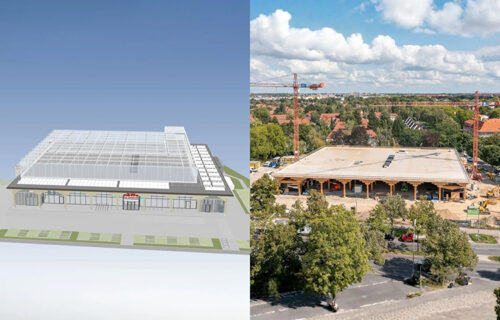A new generation of supermarket construction is taking shape in Berlin’s Lankwitz district, where REWE Group is building its second Green Farming Market — a project that combines sustainable urban agriculture with advanced digital planning. Scheduled to open in spring 2026, the development is the first REWE property to be entirely planned and executed using Building Information Modeling (BIM), a method that creates a digital twin of the building to optimize efficiency and reduce errors during construction and operation.
The supermarket features a 2,150-square-metre market hall topped by what will become Berlin’s largest rooftop farm. Operated by ECF Farmsystems, the hydroponic facility will produce up to 900,000 salad portions annually, using rainwater from a cistern and heat recovered from the store below. The timber structure of the market, built from around 1,450 cubic metres of locally sourced softwood, is designed for recyclability and carbon storage, aligning with REWE’s broader sustainability goals.
Thomas van der Broeck, Head of Digital Construction & Processes at REWE Group, explained that the BIM-based planning process transforms how the company manages its projects. “Instead of working from static plans, we now build digitally first. Every component is modeled in 3D, allowing all trades to coordinate in real time and identify conflicts before construction starts,” he said. This approach improves data quality, transparency, and efficiency, while reducing costly adjustments on-site.
Once completed, the digital twin will continue to serve during the building’s operational phase. It records the specifications of all materials and systems installed, helping maintenance teams pinpoint issues remotely and prepare for repairs more accurately. “In the future, a technician will know exactly which unit needs servicing and what tools or parts to bring before arriving on site,” van der Broeck noted, adding that such methods reduce time, costs, and environmental impact.
The Berlin Green Farming project builds on the model first implemented in Wiesbaden and is part of REWE’s long-term plan to replicate the concept across Germany. It combines locally produced food, energy-efficient design, and a circular use of resources — from renewable materials to waste heat recovery.
Construction is being led by REWE’s in-house team in cooperation with regional partners. The project has also become a testing ground for integrating new technologies and processes that REWE intends to apply to future developments. “We want to move away from paper-based processes and isolated systems toward a fully digital property portfolio,” van der Broeck said. “Digitization allows us to address both cost pressures and the shortage of skilled labor in the construction industry.”
With its combination of digital innovation and sustainable design, the REWE Green Farming Berlin project represents a step toward a more efficient and environmentally responsible model of retail development — one that may soon become standard across the group’s future properties.
